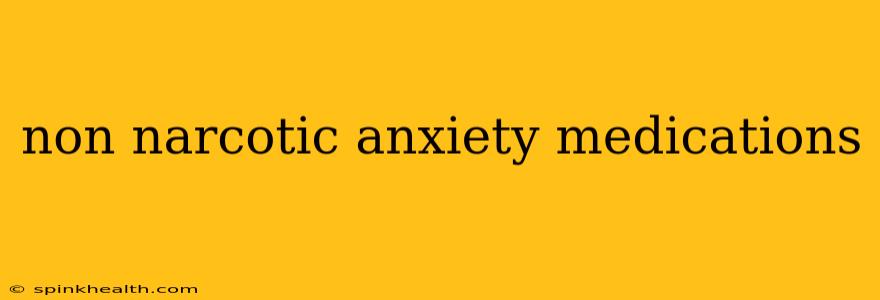Anxiety. That persistent feeling of unease, worry, and dread that can creep into our lives and disrupt everything from sleep to relationships. For many, it’s a manageable challenge, but for others, anxiety becomes a debilitating condition requiring professional help. Fortunately, there are many non-narcotic anxiety medications available to help manage symptoms and improve quality of life. This journey isn't a one-size-fits-all approach, and finding the right medication often involves trial and error, guided by a healthcare professional. Let's explore the landscape of non-narcotic anxiety treatments.
What are the different types of non-narcotic anxiety medications?
The world of non-narcotic anxiety medications is surprisingly diverse. Instead of focusing on opioids (like narcotics), these medications target different neurotransmitter systems in the brain, helping to regulate mood and reduce anxiety symptoms. They generally fall into a few key categories:
-
Selective Serotonin Reuptake Inhibitors (SSRIs): These are probably the most well-known class of antidepressants, often prescribed for anxiety disorders. They work by increasing the level of serotonin, a neurotransmitter crucial for mood regulation. Examples include sertraline (Zoloft), paroxetine (Paxil), fluoxetine (Prozac), citalopram (Celexa), and escitalopram (Lexapro). Each has its own nuances in terms of side effects and efficacy.
-
Serotonin-Norepinephrine Reuptake Inhibitors (SNRIs): Similar to SSRIs, SNRIs also affect serotonin levels but also impact norepinephrine, another neurotransmitter involved in alertness and focus. Venlafaxine (Effexor) and duloxetine (Cymbalta) are common examples. These can be particularly helpful for individuals with anxiety accompanied by depression or physical symptoms.
-
Benzodiazepines: While highly effective in reducing anxiety quickly, benzodiazepines are usually prescribed only for short-term use due to their potential for dependence and withdrawal symptoms. Examples include alprazolam (Xanax), diazepam (Valium), and lorazepam (Ativan). These are typically used to manage acute anxiety attacks or periods of intense stress.
-
Buspirone: This medication works differently than SSRIs or SNRIs. It affects serotonin and dopamine, impacting anxiety without the sedative effects often associated with benzodiazepines. It's known for its slower onset of action but can be a good long-term option for some individuals.
-
Beta-blockers: Primarily used to treat high blood pressure, beta-blockers can also be effective in managing the physical symptoms of anxiety, such as rapid heartbeat, tremors, and sweating. They don't address the underlying emotional component of anxiety but can provide significant relief from the physical manifestations. Examples include propranolol and metoprolol.
What are the side effects of non-narcotic anxiety medications?
It's crucial to remember that every individual reacts differently to medication. Side effects can vary widely, both in severity and type. Common side effects across different medications can include:
- Nausea
- Headache
- Dizziness
- Drowsiness
- Insomnia
- Weight changes
- Sexual dysfunction
How long does it take for non-narcotic anxiety medications to work?
This varies greatly depending on the type of medication and the individual. Some medications, like benzodiazepines, offer immediate relief, while others, such as SSRIs and SNRIs, may take several weeks to reach full effectiveness. Patience and consistent adherence to the prescribed dosage are crucial.
Are there any natural remedies for anxiety?
While medication can be incredibly helpful, many people find that complementary therapies enhance their treatment. These can include:
- Cognitive Behavioral Therapy (CBT): A type of talk therapy that helps individuals identify and change negative thought patterns and behaviors contributing to anxiety.
- Mindfulness and meditation: Techniques to focus on the present moment and reduce overthinking.
- Exercise: Regular physical activity releases endorphins, which have mood-boosting effects.
- Dietary changes: A balanced diet and limiting caffeine and alcohol can significantly impact anxiety levels.
What are the risks of taking non-narcotic anxiety medications?
While generally safe when taken as prescribed, non-narcotic anxiety medications do carry some risks. These include potential side effects, drug interactions, and the possibility of dependence (particularly with benzodiazepines). Open communication with your doctor is crucial to managing these risks.
Who should I talk to about non-narcotic anxiety medication?
The journey to managing anxiety often starts with a conversation with your primary care physician or a mental health professional, such as a psychiatrist or psychologist. They can assess your specific needs, discuss potential treatment options, and monitor your progress closely. Remember, finding the right treatment plan is a collaborative process, and your doctor is your partner in this journey. Don't hesitate to ask questions, voice concerns, and advocate for yourself. Seeking help is a sign of strength, not weakness.

